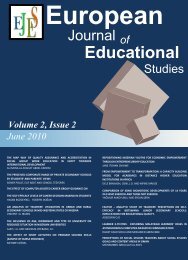principal's leadership behaviour as a determinant of effectiveness
principal's leadership behaviour as a determinant of effectiveness
principal's leadership behaviour as a determinant of effectiveness
Create successful ePaper yourself
Turn your PDF publications into a flip-book with our unique Google optimized e-Paper software.
Europan Journal <strong>of</strong> Educational Studies 2(1), 2010<br />
make the society lose confidence in the system. For instance, the students’ academic performance which<br />
members <strong>of</strong> the society used mainly to me<strong>as</strong>ure the <strong>effectiveness</strong> <strong>of</strong> schools h<strong>as</strong> witnessed unprecedented set<br />
back. Ajayi (2002), WAEC (2007), Adeyemi (2008) have shown in their studies the extent <strong>of</strong> poor performance<br />
<strong>of</strong> students in public examination. The most recent w<strong>as</strong> seen in the Punch Newspaper (September 27, 2008)<br />
where it w<strong>as</strong> reported that 83% <strong>of</strong> the candidates that sat for May/June 2008 West African Senior School<br />
Certificate Examination (WASSCE) failed. This is disheartening.<br />
Besides, it h<strong>as</strong> again been observed that students <strong>of</strong> secondary schools lack morals. High rate <strong>of</strong> indiscipline<br />
which manifests in form <strong>of</strong> absence from school, lateness to school, stealing, insubordination to school<br />
authority, smoking, cheating in examinations and among others are daily happenings in the schools. This raises<br />
a fundamental question <strong>as</strong> to the extent to which the schools are producing disciplined or morally upright school<br />
leavers into the larger society. Oladele (2003) argued that the cause <strong>of</strong> the moral decadence among the youth is<br />
traceable to the non-teaching <strong>of</strong> ethics in the secondary schools.<br />
Personal experience h<strong>as</strong> also shown that very few secondary school leavers can communicate effectively or<br />
exhibit evidence <strong>of</strong> good and solid education background. It appears the students lack requisite technical skills<br />
to be able to function effectively in the society. All these scenario are pointers to the fact that the secondary<br />
school system is in a state <strong>of</strong> despair.<br />
Several factors have been attributed to the perceived in<strong>effectiveness</strong> <strong>of</strong> the secondary schools among which are<br />
teacher factor, parental factor, economic factor, societal factor and principals’ <strong>leadership</strong> <strong>behaviour</strong> but this<br />
study w<strong>as</strong> limited to the principals’ <strong>leadership</strong> <strong>behaviour</strong> <strong>as</strong> a potent factor for school in<strong>effectiveness</strong>. It h<strong>as</strong><br />
been observed that many secondary school principals do not involve their subordinates in their daily routine<br />
administrative duties and <strong>as</strong> a result do a lot <strong>of</strong> things themselves.<br />
Personal experience have shown that many principals <strong>of</strong> secondary schools do not provide good <strong>leadership</strong> <strong>of</strong><br />
the school system. Some do not motivate their teachers very well, some do not even relate very well with the<br />
teachers let alone students. It appears some member <strong>of</strong> teaching staff do not feel comfortable with the ways their<br />
principals behave in schools. This seems to be the re<strong>as</strong>ons why most teachers put up non-challant attitude<br />
towards their job and consequently leads to in<strong>effectiveness</strong> <strong>of</strong> the schools.<br />
The <strong>behaviour</strong> <strong>of</strong> leaders h<strong>as</strong> been identified <strong>as</strong> one <strong>of</strong> the major factors influencing the productivity <strong>of</strong><br />
subordinates in any organization in which the school system is not an exemption (Babayemi, 2006). Ibukun<br />
(1997) remarked that without <strong>leadership</strong>, an organization can best be described <strong>as</strong> a scene <strong>of</strong> confusion and<br />
chaos. According to the author, when <strong>leadership</strong> in an organization is effective, there is progress, but when the<br />
<strong>leadership</strong> is defective, the organization declines and decays.<br />
Purkey and Smith (1983), Cruz (1995) submitted that in order to build strong teacher commitment towards the<br />
realization <strong>of</strong> school goals, principals must provide strong, directive <strong>leadership</strong> in setting and developing school<br />
goals, creating a unity <strong>of</strong> purpose, facilitating communication and managing instruction Weber (1971) and<br />
Scheerens and Creemers (1989) submitted that strong <strong>leadership</strong> embodied in the principal w<strong>as</strong> instrumental in<br />
setting the tone <strong>of</strong> the school.<br />
It can be inferred from the foregoing that principal’s <strong>leadership</strong> <strong>behaviour</strong> h<strong>as</strong> a very positive relationship with<br />
school <strong>effectiveness</strong>. It w<strong>as</strong> again this backdrop that the present study found out the relationship between<br />
principal’s <strong>leadership</strong> <strong>behaviour</strong> and <strong>effectiveness</strong> <strong>of</strong> secondary schools in Nigeria.<br />
PURPOSE OF THE STUDY<br />
The purpose <strong>of</strong> this study w<strong>as</strong> to find out the relationship between principal’s <strong>leadership</strong> <strong>behaviour</strong> and the<br />
<strong>effectiveness</strong> <strong>of</strong> secondary schools in Nigeria. The study investigated the extent <strong>of</strong> principal’s <strong>leadership</strong><br />
<strong>behaviour</strong> in the secondary schools and the extent <strong>of</strong> <strong>effectiveness</strong> <strong>of</strong> the schools in the three domains <strong>of</strong><br />
learning. B<strong>as</strong>ed on the findings, recommendations were made on how to improve the <strong>effectiveness</strong> <strong>of</strong> the<br />
secondary schools.<br />
26

















